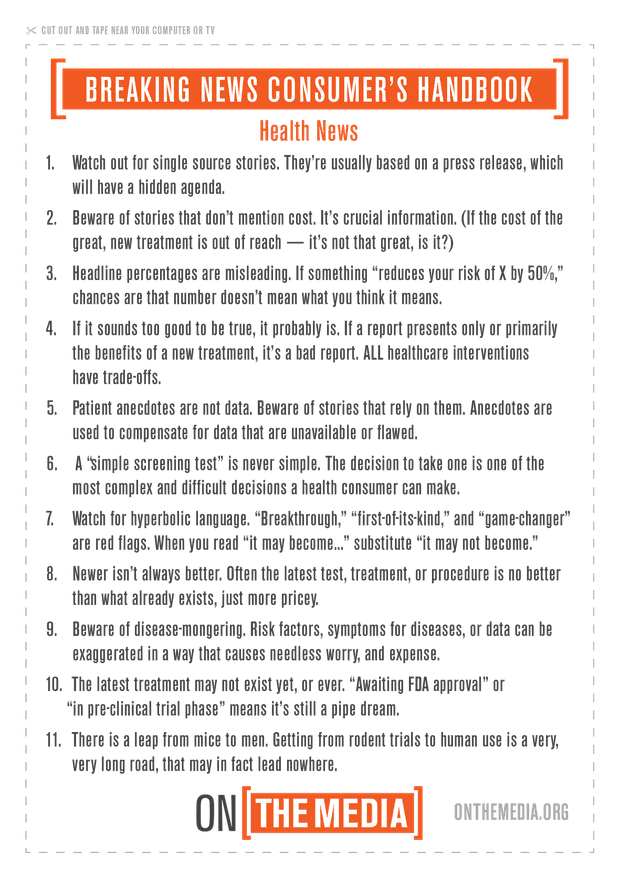Chocolate causes weight-loss? Sleeping too much can kill you?! Before reposting "health news" see if it passes the test: Breaking News Consumer's Handbook: Health News Edition.
Just the other week many of us saw a glaring example of bad science taking the media by storm. As the year closes, we can reflect on the year in science vs. the narrative constructed by the media. Thankfully, WNYC produced this awesome "Breaking News" survival guide; how to tell the real science from the junk science and cut through the media sensationalism.
Plant Based Yogi's purpose is to share the benefits of health and yoga through inspirational recipes, stories and philosophy. My blog is aimed at helping and inspiring others to thrive on plants and savor the deliciousness of life.
Navigation Links
▼
Monday, December 28, 2015
Wednesday, December 16, 2015
No, Eating Bacon is Not Better for the Environment than Eating Lettuce
Recent news headlines highlight yet another example of media sensationalism rather than properly vetting a poorly designed study. No, that one study from Carnegie Mellon does not show that eating plants is worse for the environment that the standard American diet (SAD).
Yes, every other major _properly designed_ study done by credible organizations like the UN, FAO, DGAC, EWG, etc. is still valid shows that the more plant-based we eat, the less environmental impact.
The CM study is just a rehashing of the calorie per calorie approach of comparing lettuce vs. bacon which makes absolutely no sense. Unfortunately, the majority of news reporting of the CM study does not bother to highlight this glaring study flaw and most people who read the news won't go beyond the headlines.
The author of the study concludes:
“My bottom line is that there are no simple answers to complex problems,” Fischbeck said. “Diet and the environmental impact of agriculture … is not a simple problem.”
That statement is so utterly misleading. Of course, science is complicated. That's why we use science to help us figure out how to solve complicated problems. But this kind of statement is akin to saying 'why even try to solve a problem, it's all so big and complicated.'
But if you actually read the study, and come to your own conclusion you would see that:
the researchers didn't find that vegetarianism is bad for the environment. They found that not every plant product is more environmentally friendly than every meat product on a calorie per calorie basis
Furthermore, the study quite oddly does not actually look at healthy vegetarian diets. They define the healthy diet as consuming a lot of dairy and fish! Of course, we know how the inclusion of dairy and fish is extremely energy intensive and unsustainable.
I'm left a bit puzzled what the CM researchers were after when they did their analysis in such a biased way. Or maybe they were just looking for rationalization to continue to cling to unsustainable bad habits?
Fortunately some columnists were quick to point out the obvious flaws:
http://www.huffingtonpost.com/entry/vegetarian-bad-for-environment-debunked_567072d7e4b0e292150f95a4
If you hear an omnivore try to convince you that eating meat is better for the environment, check out the links above for the logical rebuttals. Better yet, have them watch Cowspiracy.
Tuesday, December 15, 2015
Healthy Diets Broken Down into Five Simple Principles by Jeff Novick
Jeff Novick, MS, RD offers a simple, practical, evidence based approach to eating healthy; devoid of labels, dogma, and pontification. It requires no measuring, no counting, no reductionism, but it does require some planning and discipline to put it into practice.
Embrace these 5 basic principles and you are well on your way to optimal eating. We desperately need more health practitioners to offer such practical guidance on diet like this.
Read more here and check out Jeff Novick's site.
Embrace these 5 basic principles and you are well on your way to optimal eating. We desperately need more health practitioners to offer such practical guidance on diet like this.
Now, if there were ten of us in the room, we could each implement these pillars slightly differently and still each have a healthy diet and great health results. That’s because when we look at the research evidence, there’s no one specific diet that is “best.” Instead, there are common denominators across healthy diets that combine to make up a healthy dietary pattern, and these are reflected in my five guidelines/principles of healthy eating.I love Jeff's approach and his writing because he's so down to earth and he knows the science cold. He was one of the first of the WFPB doc's to demonstrate just how easy it can be to eat super healthy, utilizing frozen vegetables, easy to find spices and canned goods. It doesn't get any simpler or cheaper than this. I highly recommend this approach to anyone who thinks eating healthy has to be complicated or expensive.
Read more here and check out Jeff Novick's site.
Thursday, December 10, 2015
Do We Want to Know How Our Food is Made?
Earlier this week, I listened to a special report on food production and food safety.
I found this special report fascinating. It's all about the process of how food ends up on our plates (which a big portion is dedicated to meat production). What's more fascinating is that I'd bet that most meat eaters will have no interest in listening to this. "I don't want to know [what happened to this animal before it got to my plate]" For the food I now eat, I'm continuously fascinated by and eager to learn more about how plant based food is produced, harvested and distributed. Doesn't that reveal something about it if we want to willingly remain in the dark about the food we put in our bodies and feed our families with?
Hopefully this popular mindset is changing. More people are getting interested in particular parts of the story about how food is made. There are growing concerns about local, organic, and GMOs. Most importantly, this special report also focuses on the workers who make this whole process possible. There are so many abuses in our food system and parallels between the exploitation of animals and people caught in the middle. The way our food is made today neglects fundamental human and animal rights.
We can make the companies that produce our food change. We make a difference every day by voting with our dollars. As much as we tend to villainize big corporations, I believe they will necessarily be part of the solution...if we make them change.
Farm to Fork: Uncovering Hazards in Our Food Systems
Hopefully this popular mindset is changing. More people are getting interested in particular parts of the story about how food is made. There are growing concerns about local, organic, and GMOs. Most importantly, this special report also focuses on the workers who make this whole process possible. There are so many abuses in our food system and parallels between the exploitation of animals and people caught in the middle. The way our food is made today neglects fundamental human and animal rights.
We can make the companies that produce our food change. We make a difference every day by voting with our dollars. As much as we tend to villainize big corporations, I believe they will necessarily be part of the solution...if we make them change.
"At the center of these complex systems [all the various ways food gets to us] is people. There is stark contrast between the condition of the foods we see in grocery stores and the conditions the workers ensure to put it there. But change is possible."
Wednesday, December 9, 2015
Climate Talks and Walking the Walks
This week world leaders have gathered in Paris for the COP21 to discuss solutions for the climate crisis we're in. I've been reading news accounts about protests outside the convention where activists are urging leaders to recognize the effects of raising and killing animals for food on our environment. It's been years since the famous UN FAO report tallied up the causes of climate change and found that the animal food industry is the largest contributor to greenhouse gases, species extinction, land use, deforestation, water use, and waste - by a large margin. On just greenhouse gases alone, they account for more than 18% which is more than every car, truck and airplane on the planet.
I do think we need leadership on a global scale, but I am less hopeful that this will be the message from the COP21 talks. The good news is that people are catching on. Movies like Cowspiracy are helping to shine a light on the elephant in the room.
This was a big year for veganism hitting the mainstream conscious. This week we saw a great example: I may not agree with Arnold Schwarzenegger on many things but he does know a lot about bodybuilding, and now even he says A) we don't need meat to build muscle and B) we'd all be better off if we ate less meat.
I do think we need leadership on a global scale, but I am less hopeful that this will be the message from the COP21 talks. The good news is that people are catching on. Movies like Cowspiracy are helping to shine a light on the elephant in the room.
This was a big year for veganism hitting the mainstream conscious. This week we saw a great example: I may not agree with Arnold Schwarzenegger on many things but he does know a lot about bodybuilding, and now even he says A) we don't need meat to build muscle and B) we'd all be better off if we ate less meat.
You don't need meat to grow strong and heathy
"Luckily we know that you can get your protein from many different ways. You can get it from vegetables; I have seen many bodybuilders and lifters that are vegetarian and get strong and healthy and many who eat meat who get strong and healthy." - Arnold Schwarzenegger.One protein source feels pain and is linked to the increased risk of many diseases, and has awful environmental consequences, the other protein source (plants) does not... It's an easy choice.
Posted by Vegan Bodybuilding, Health and Nutrition on Tuesday, December 8, 2015
Tuesday, December 8, 2015
Green Bananas As a Cashew Substitute?
I have to try this. Apparently you can use cooked green bananas to replace cashews in many recipes. Cook them in the Instant Pot and freeze the biomass. Method from UC Davis

UC DAVIS
Integrative Medicine Program
Monday, December 7, 2015
The Roots of Hanukkah and a Root Vegetable Latke Recipe
I like to celebrate by thinking about those who need a little more light in their life. Even if we're not lighting candles, we can share our inner light with everyone. We can help light the way for others who may have lost their way in darkness. Whenever we say "namaste," we're making a dedication to share our love, light and compassion that we all have within us. While I may not be religious,I see the major winter holidays like Hanukkah, Kwanza and Christmas are all rooted in this message of sharing our light. Perhaps that's why so many decorate their homes with lights...on the outside!
So when I see a house covered in Christmas lights, windows filled with brightly lit menorahs, or lavishly decorated trees, I don't view them as reminders to shop and buy things we don't need. All I see are reminders of how we can bring more light and color into the world.
And in the spirit of the root of Hannukah...I'm excited to try this root vegetable take on vegan latkes! :) Looks delicious!!! I will try baking these without oil: From Delicious Everyday: Parsnip Latkes with Mustard Cashew Cream and Honey Roasted Apples


